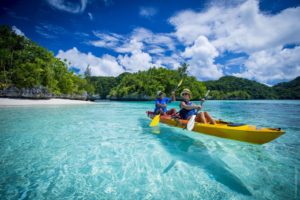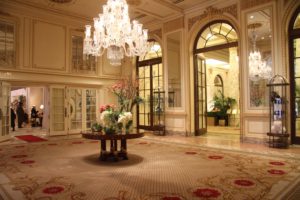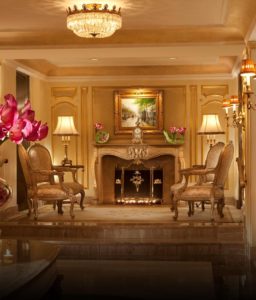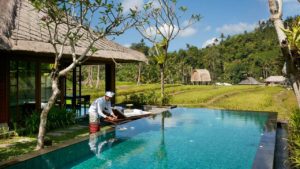As concerns for the environment increases, governments across the world are looking at the idea of promoting of green luxury travel.
Palau – Best Eco-Travel Destination for 2016
Across the world, countries like the US, Britain, and most of Europe are pitching in for green travelling, introducing policies that will help their luxury hotel and tourism industry to implement sustainable practices.
The latest to join the green bandwagon is India. The Ministry of Tourism has inked a memorandum of understanding with the non-profit organization, Ecotourism Society of India (ESOI), which will drive the Sustainable Tourism Criteria for India (STCI) initiatives across the country and prepare a 10-year road map for advocacy and certification under the STCI.
To prepare this plan, the society will hold regional workshops with relevant stakeholders across India. Based on the feedback, it will formulate the criteria and classification guidelines for certification for both accommodation and tour/travel operators, within the set guidelines. At a later stage, the ESOI will also develop standards, in sync with the internationally accepted Global Sustainable Tourism Criteria, for tourism destinations. ESOI will also help develop policy guidelines, a code of conduct and ethical practices for sustainable tourism.
The government hopes to take its commitments to responsible tourism to the next level with this initiative. In this regard, the ministry had rolled out the process with the ESOI years ago, formulating STCI and taking it to the grassroots via advocacy workshops.
Marriott Green
Even before the Indian government woke up to the need of green tourism, luxury hotels in India had already begun exploring the options. According to the Accor Asia Pacific Business Traveller Survey, which mapped business travel habits in the region, 66 per cent Indian travelers prefer environmentally more conscious hotels with 62 per cent claiming they are even prepared to pay an additional 10 per cent for hotels with a better environmental commitment than a comparable hotel.
Param Kannampilly, Chairman and Managing Director, Concept Hospitality Limited says, “A green hotel is popularly known as a LEED certified hotel. The person who is giving the certification should understand green building principles.” The first green hotel which was fully operated in India was The Park Hotel at Hyderabad, in 2009, with 280 rooms and 90 per cent of the area marked as non-smoking area. Since then, several hotels have adapted green practices and policies.
“The factors which help in attaining green hotel certification are Reduce, Reuse and Recycle. How much you have reduced, total AC consumption, water utilization, garbage disposal, utilizing the correct kind of cement, whole lot of things are attached to it,” adds Kannampilly. LEED, which stands for Leadership in Energy and Environmental Design, is a third party verification of green buildings. Developed by the U.S. Green Building Council (USGBC), it consists of a suite of rating systems for the design, construction and operation of green buildings. LEED certified buildings are intended to use resources more efficiently when compared to conventional buildings. LEED certified buildings often provide healthier work and living environments, which contributes to higher productivity and improved employee health and comfort.
The Plaza Hotel, New York
The luxury eco-tourism industry has seen massive growth, growing 20%-34% per year. The hospitality and travel industries are rapidly adapting to green norms. Your flight’s pollution can be “offset” by tree planting or investments in alternate energy sources; your hotel may reuse washing-machine water and buy only local products for its restaurant; your tour operator may donate part of its profits to helping local communities and to offset the pollution the trip creates. At New York’s Plaza Hotel, you can now organize a “100-mile menu” event, with the food coming from within 100 miles (160 kilometers) of the city. The Marriott hotel chain recently announced it will list each hotel’s green initiatives on its website.
Waldorf Astoria, New York
In New York this year, 17 hotels announced their plans to become greener — the Grand Hyatt is installing LED lights in the hotel and exhaust controls in its four kitchens, while the Waldorf Astoria will replace its windows to make them more energy-efficient. Owned and operated by Ritz-Carlton, Mandapa, a reserve located along the Ayung River in Ubud, Bali, has 60 suites and villas, with two swimming pools and a luxury spa. Aside from the locally sourced materials used for the interiors, the Mandapa also has an organic garden, farm, and an eco-educational kid’s hut on-site that partners with the Green School Bali. The property also has its own rice field where guests can experience the local agriculture by learning to plant, harvest, and tend to rice cultivation.
A new regional airline in Portland, Ore., recently proclaimed itself the world’s first “green airline,” because it uses small, fuel-efficient planes and offsets the environmental impact of the jet fuel by donating money to preserve forests in the U.S. Pacific Northwest. There are internet based travel companies that help you plan a eco holiday. Sustainable Travel International, a non-profit organization that promotes clean travel, uses its website to help travelers plan their trips. It also outlines credible eco-label and eco-certification programs.
Mandapa, Bali
Among the best travel destination for 2016, is the island nation of Palau, surrounded by crystal-clear sea just off the coast and a colorful underwater wonderland, featuring more than 500 species of coral teeming with some 1,400 kinds of fish. On land, travelers can wander along unspoiled beaches or go trekking through dense jungles. Palau’s remote location in the westernmost corner of Micronesia has helped to shield both its natural resources and its cultural traditions from the detrimental effects of mass tourism, and the locals are working to make sure their island paradise stays pristine well into the future. About 460 miles of reefs and lagoon waters are dedicated no-fishing zones, which has allowed many endangered species of fish to repopulate the area. The Palau Conservation Society manages nearly two dozen conservation areas and encourages sustainable development to protect the islands’ fragile ecosystems.
The future of luxury travel, as much as its fashion, is sustainable and eco-friendly.







